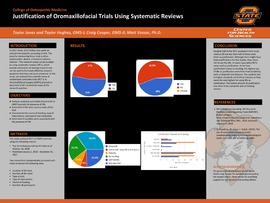| dc.contributor.author | Jones, Taylor | |
| dc.contributor.author | Hughes, Taylor | |
| dc.contributor.author | Cooper, Craig | |
| dc.contributor.author | Vassar, Matt | |
| dc.date.accessioned | 2020-04-14T16:12:33Z | |
| dc.date.available | 2020-04-14T16:12:33Z | |
| dc.date.issued | 2019-02-22 | |
| dc.identifier | ouhd_JonesHughes_justificationoforomaxillofacial_2019 | |
| dc.identifier.citation | Jones, T., Hughes, T., Cooper, C., & Vassar, M. (2019, Feb. 22). Justification of oromaxillofacial trials using systematic reviews. Poster presented on Research Day at the Oklahoma State University Center for Health Sciences, Tulsa, OK. | |
| dc.identifier.uri | https://hdl.handle.net/11244/323848 | |
| dc.description.abstract | Aims: In 2017 alone, $12.7 billion was spent on clinical trial research, though basis for conducting these trials is often questionable, absent, or based in industry interest. Systematic reviews (SR's) provide summaries of existing research and can be used to formulate effective research questions that have not been answered. In this study, we analyzed the scientific bases of randomized controlled trials (RCT's) in Oromaxillofacial Surgery (OMFS) journals to determine if SR's formed the basis of the research question. | |
| dc.description.abstract | Methods: This study analyzed RCT's in the top 10 ranked OMFS journals by h5 index as of October 10, 2018. It includes all manuscripts published January 1, 2015 - December 31, 2017. We screened each study to extract data relating to funding sources, presence of SR citations, and research methodology. | |
| dc.description.abstract | Results: Nearly half of the RCTs cited at least one SR in the introduction of the paper, but less than half of those used the SR review as justification of the trial. 34.5% of the manuscripts did not report their funding, and 25.6% explicitly declared no funding. Self-funded manuscripts cited SR's at the lowest rates in this study. Interestingly, the highest incidence of SR justification occurred when funding was received from a combination of non-profits and industry. Nonprofit papers and those without funding had the lowest incidence of SRs justification. | |
| dc.description.abstract | Conclusions: Proper justification for OMFS clinical trials most often occurs when both industry and nonprofit organizations are invested in the research. More effective research could be performed if journal editors required researchers to cite evidence that their studies were necessary. | |
| dc.description.abstract | Significance: While a minority of manuscripts published in high-impact OMFS journals mention SR's as justification for conducting the trial, awareness of proper justification should be increased among the scientific community. This is most likely to occur when both the public and private sectors are invested in the research. | |
| dc.format | application/pdf | |
| dc.language | en_US | |
| dc.publisher | Oklahoma State University Center for Health Sciences | |
| dc.rights | The author(s) retain the copyright or have the right to deposit the item giving the Oklahoma State University Library a limited, non-exclusive right to share this material in its institutional repository. Contact Digital Resources and Discovery Services at lib-dls@okstate.edu or 405-744-9161 for the permission policy on the use, reproduction or distribution of this material. | |
| dc.title | Justification of oromaxillofacial trials using systematic reviews | |
| osu.filename | ouhd_JonesHughes_justificationoforomaxillofacial_2019.pdf | |
| dc.type.genre | Presentation | |
| dc.type.material | Text | |
